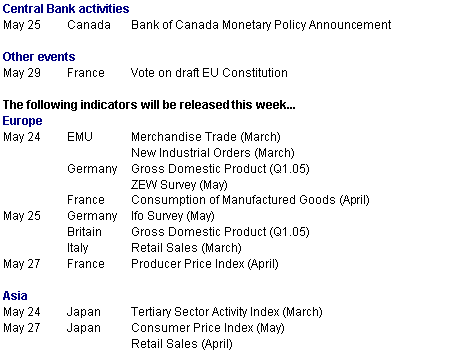Monday, May 23, 2005

Global Markets
After a tepid beginning to the week, equities rallied when the U.S. consumer price index report showed that inflation wasn't as bad as some thought. While the core CPI was unchanged on the month, the full index jumped 0.5 percent on food and energy price increases. (Reminder - one month does not make a trend.) Also helping the more benign inflation outlook was continued stabilization of oil below the $50 a barrel mark. U.S. equities responded favorably and markets elsewhere followed suit. The dollar rallied against both the euro and yen on the news, although some analysts fretted that the benign CPI could lead to slower interest rate increases by the Federal Reserve. At week's end, the euro dropped primarily because of uncertainty surrounding the outcome of French and Dutch referendums on the EU constitution next week. Ten of the 13 equity indexes followed here were positive for the week. The Nikkei, Topix and Hang Seng lost ground in Asia.
Global Stock Market Recap

Europe and Britain
Bulls prevailed on Wednesday as the FTSE soared to its highest level since April 14th after the benign U.S. CPI reading which bolstered the view that inflation is under control. The FTSE followed with a positive performance on Thursday when British retail sales jumped much more than expected. Mining companies were up on expectations that Chinese demand for raw materials will climb. As evidence, they pointed to the Chinese April industrial output report which soared 16 percent above the same month in 2004. Crude oil prices continued to decline which was also a boost to equities. U.S. stock gains for the first three days of last week contributed to the good humor of investors.

The CAC and DAX closed at a one-month high as resurgent telecoms stocks and gains in the oil sector offset profit taking which followed the previous three sessions of gains. On the week, all three indexes more than offset the previous week's losses.
Asia/Pacific
In Asia, the trend was weaker amid concerns over the threat of fund outflows on growing expectations that China will not revalue its currency in the short term. On Thursday Asian stock markets made strong gains in response to Wednesday's benign U.S. inflation data and strong gains on Wall Street. Japan's Nikkei 225 Average had its best day so far this year, rising 2.2 percent. But the Nikkei and Topix both retreated over the week after some mixed GDP data. First quarter GDP growth, released on Tuesday, jumped by an unexpected 1.3 percent - almost twice the rate expected. However, the underlying data show Japan continuing to suffer from deflationary pressures.
In Hong Kong, stocks underperformed as initial enthusiasm for modifications to the Hong Kong dollar's peg to its U.S. counterpart was tempered by increases in local interest rates. HSBC, Hong Kong's biggest lender, raised its prime rate by 50 basis points, a move that was quickly followed by other banks. Rate sensitive property stocks dropped as a result. Exporters' stocks performed well as the CPI data soothed concerns about the possibility of aggressive interest rate increases by the Fed. But despite Thursday's gains, Japanese stocks were down on the week as were those in Hong Kong.

The Bank of Japan relaxed cash targets in the financial system after its two day meeting on Friday - a move that indicates a tentative step toward tighter monetary policy amid signs of a gradual economic recovery. The Monetary Policy Board voted to allow the amount of liquidity pumped into the system to temporarily fall below the bank's target range if necessary. The action was expected and leaves unchanged the target for liquidity, or commercial banks' account balances at the Bank of Japan, at between ¥30 trillion and ¥35 trillion ($280 billion and $327 billion). In recent months, a drop in cash demanded by commercial banks has made it increasingly difficult for the bank to maintain its target band. Interest rates remain near zero.
The Bank also left its overall core economic assessment in May unchanged from the previous month, repeating that the nation's recovery continues. But the central bank in its monthly report upgraded its assessment on industrial production, saying output is increasing. Last month, it had said industrial production remained flat.
On the eve of the Bank of Japan's meeting, the country's Finance Ministry weighed into the debate about monetary policy, warning the Bank that it was too early to change course. The BoJ has been openly discussing the possibility of tweaking its quantitative easing policy, in place for four years, in spite of the fact that deflation has not yet been defeated. Japan has been mired in deflation for the past seven years. Last year the BoJ predicted deflation would come to an end this fiscal year, but last month it was forced to admit that it had been over-optimistic. The BoJ is committed to keeping interest rates at zero until the consumer price index becomes positive. However, the bank has floated the idea of mopping up the huge amounts of excess liquidity with which it has flooded the market for the past four years. Two board members have voted to reduce the targets.
Currencies
The euro dropped sharply this week on a combination of factors. The first is the moribund economy in Europe, while the second has to do with the looming referendums over the proposed EU constitution in the next 10 days. France votes on May 29th while the Netherlands votes on June 1st. With the French referendum too close to call but leaning towards rejection, analysts see the vote there really as a vote on domestic economic and political issues. In the Netherlands, the list of negatives is formidable and encompasses many of the displeasures of the smaller EU countries with EU policies especially the manipulation of the Stability and Growth Pact for the benefit of Germany, France and Italy. The vote there is expected to be against the treaty. With a unanimous vote needed for adoption, analysts are trying to discern what rejection would mean to the EU and in particular to the euro. The drop in the euro probably reflects the uncertainties that a No vote presents, especially since the EU appears not to have a plan B.

With the dollar rising in value, no one over seas will complain. They once again have an opportunity to boost exports by having their products priced more competitively. The yen was down despite a higher-than-expected first quarter GDP report.

Indicator scoreboard
EMU - March industrial output was down 0.2 percent and was unchanged when compared with last year. Intermediate goods output was down 0.8 percent, nondurable consumer goods slipped by 0.4 percent, and durable consumer goods were down 0.3 percent. Capital goods output, however, was up 1 percent while energy goods output climbed 0.6 percent. By country, both monthly and yearly changes varied widely.

April harmonized index of consumer prices were up 0.4 percent and 2.1 percent when compared with last year. Excluding energy, food, alcohol and tobacco, the HICP was up 0.3 percent and 1.4 percent on the year. The HICP excluding energy and unprocessed food, the ECB's preferred core measure, was also up 0.3 percent and 1.4 percent on the year. Prices were up for transport fuels, garment prices, footwear and heating oil.

Germany - March seasonally and workday adjusted manufacturing orders were revised downward slightly to an increase of 2.1 percent from the originally reported increase of 2.2 percent on the month. Foreign orders were revised downward to an increase of 2.3 percent from the originally reported 2.4 percent increase. Domestic orders were unrevised with an increase of 2 percent. Capital orders were revised down to an increase of 2.9 percent from the originally reported 3.1 percent gain.

April producer price index was up 0.7 percent and 4.6 percent when compared to last year. Excluding energy, the PPI was flat and gained 2.3 percent on the year. Energy prices were up 3.6 percent and 13.2 percent on the year. Other prices varied little from the previous month. Investment goods prices were down 0.2 percent but were up 0.9 percent on the year.

France - First quarter gross domestic product was up 0.2 percent and 1.7 percent when compared with the same quarter a year ago. Consumer spending in the first quarter rose 0.7 percent, after an increase of 1.1 percent in the final quarter of 2004. Business investment rose by 1.6 percent after a 1.9 percent rise in the previous quarter. With this release, the base year used for Insee's calculation was changed to 2000 from 1995.

Italy - March merchandise trade deficit was €865 million compared with a deficit of €1.4 billion in February. A year ago, the merchandise trade balance showed a surplus of €581 million. Exports were up 5.1 percent while imports soared 11.1 percent on the year. Refined petroleum product exports jumped by 62.8 percent while those of metal and metal products were up 21.9 percent. Leather and leather product exports sank 8.9 percent.

March seasonally adjusted industrial orders sank 1.7 percent and were down 3.6 percent when compared with last year. Domestic orders were down 1.1 percent while foreign orders declined by 2.8 percent. Non-seasonally adjusted textile and clothing orders plummeted 21.8 percent on the year. These items account for 13.7 percent of the orders index. Orders were down in seven of the ten product groups on the year. No comparable product breakdown is available for the monthly numbers.
Britain - April consumer price index was up 0.4 percent and 1.9 percent when compared with last year. Increased water and sewerage charges were offset by declines in the price of food. The retail trade index less mortgage interest payments was up 0.5 percent and 2.3 percent on the year.

April claimant count unemployment was up by 8,100 but the claimant unemployment rate remained at 2.7 percent. For the three months through March International Labour Organization unemployment was down by 15,000 when compared with the previous three months. The ILO unemployment rate was 4.7 percent. Employment climbed by 87,000 jobs for the three months through March.

Average earnings for the three months through March were up by 4.6 percent when compared with the same three months a year earlier. Average earnings for the month of March were up 4 percent on the year. Excluding bonuses, average earnings were up 4.1 percent on the year. Private sector earnings were up 4.6 percent while the public sector gained 4.5 percent. Manufacturing earnings were up 3.4 percent while services were up 4.9 percent.

April retail sales were up 0.5 percent and 2.3 percent when compared with last year. All categories of spending were up with the exception of non-specialized stores. Non-store retailing and repair sales jumped 7.4 percent while textile, clothing & footwear were up 1.2 percent. The data were adjusted for the timing of Easter which was in March this year but April last year.

Asia
Japan - First quarter gross domestic product was up by 1.3 percent and 0.8 percent when compared with the same quarter a year ago. On an annualized basis GDP jumped by 5.3 percent. The expansion marked a strong rebound following flat growth in the fourth quarter of 2204 and slight contractions in the two quarters before that. Domestic private consumption was up 1.2 percent on the quarter. Consumption had dropped 0.4 percent in the previous quarter. The fourth quarter had been adversely affected by typhoons and earthquakes that depressed spending. Capital investment was up 2 percent after a 0.2 percent decline in the previous quarter. Exports were down in the first quarter for the first time since the fourth quarter of 2001. The GDP deflator, which measures the degree of deflation, was down 1.2 percent compared with a decline of 0.4 percent in the previous quarter.
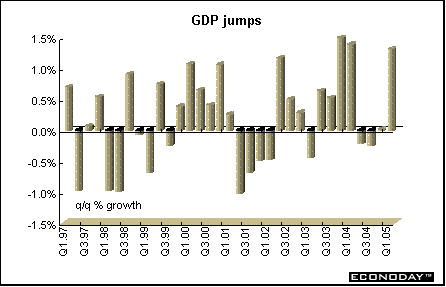
March seasonally adjusted industrial output was revised to a decline of 0.2 percent and was up 1.2 percent when compared with last year. Shipments were revised upward to an increase of 0.7 percent from the originally estimated gain of 0.3 percent.
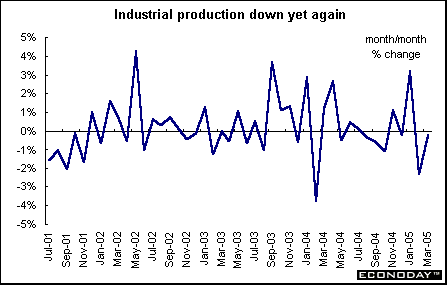
Americas
Canada - April seasonally adjusted consumer price index was up 0.3 percent and 2.3 percent when compared with last year. Excluding food and energy, the CPI slipped 0.1 percent but was up 1.2 percent on the year. The Bank of Canada CPI, which excludes eight most volatile items, was unchanged on the month and up 1.7 percent on the year. Gasoline prices were up 5.2 percent, electricity was up 6.6 percent and fresh vegetables were up 5.5 percent on the month. Offsetting these increases were declines for women's clothing (down 6.8 percent), natural gas (down 3.8 percent and auto leases (down 0.6 percent).
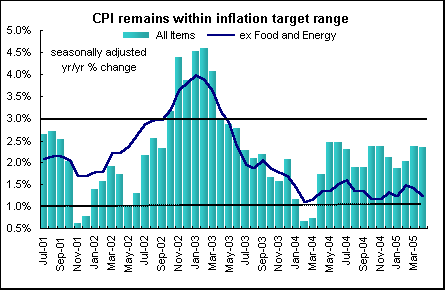
March retail sales were up 0.2 percent and 5.7 percent when compared with last year. Excluding autos, sales jumped 0.9 percent and 7.4 percent on the year. Sales were down in four of the eight sectors. Furniture declined by 1.5 percent, autos by 0.8 percent, clothing by 0.7 percent and building supplies by 0.6 percent. Expenditures on food, general merchandise, pharmacy and miscellaneous were up 1.7 percent, 1.1 percent, 1 percent and 0.9 percent respectively.
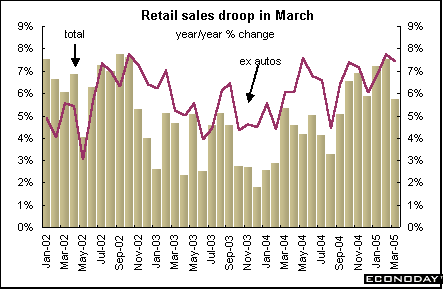
Bottom line
The French vote on the proposed European Union constitution on Sunday, May 29th while the Dutch vote on Wednesday June 1st. Citizens of both countries are expected to vote No. Analysts say that the euro along with EMU equities and bonds could suffer from the rejection. Some say that the loss of momentum in political convergence risks exposing growing economic divergences in Europe which could dampen the appetite for further EU enlargement. Other analysts think the EU will continue to muddle through with existing treaties. EU rules require that the constitution be ratified unanimously by all 25 member countries.
Looking Ahead: May 23 through May 27, 2005
